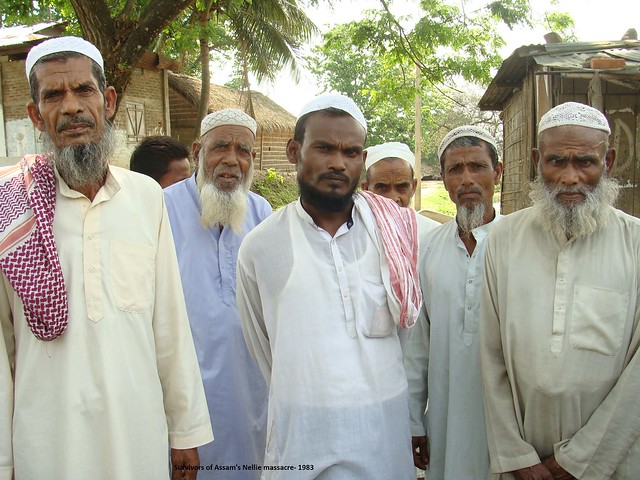By V.K. Tripathi
The wild statement by Union Minister of State for Home Affairs, Mr. Kiran Rijiju, that the country has 20 million Bangladeshis, has emboldened the extremists in Assam and raised the specter of Nellie like massacre that killed 3000 poor Muslims in one day in 1983.
As the ruling party has apathy to Muslim Bangladeshis only, Rijiju’s statement, by default, has given credence to sectarian propaganda that the country has crores of Bangladeshi Muslims. It is a gross overstatement. Assam and West Bengal are the two states where most of the Bangla speaking Muslims of India live. The total Muslim population in these states, including Assamese speaking Muslims, is around 30 million (31% in 30 million population of Assam and 25% in 80 million population of West Bengal). In 1941 census, the Muslim population of Assam was 26% (5 percentage points below the 2011 census). West Bengal Muslim population in 1941 might also have been below 2011 census by similar percentage points.
The increase in percentage Muslim population in these states has been primarily due to the refugees (one crore Hindus and Muslims) during the creation of Bangladesh in 1971 who came to India due to heavy military repression. India played proactive role in the creation of Bangladesh. Afterwards many refugees returned but many stayed back in India. In 1985 the Government of India, Assam Government and All Assam Students Union (Assam Gana Parishad) signed an agreement according to which the people who migrated to India prior to March 25, 1971 were eligible to Indian citizenship.
In 1998, Election Commission of India had got the electoral rolls prepared for Assam At that time ‘D’ was marked against the doubtful cases who could not produce all the requisite proofs of Indian citizenship. According to Government statistics (cf. Samir Kar Purkayastha in “Branding the Migrant”, ed. Atig Ghosh, Frontpage, 2013), up to January 31, 2011, 2.22 lakh ‘D’ voters were referred to the tribunals and out of these 83 thousand cases were disposed off . Among these 5,577 cases (about 5.5%) were found to be foreigners.
As per statement submitted by the State Government in the Guwahati High Court on March 8, 2011, a total number of 4.06 lakh cases under the three categories (“D” voters, cases directly sent by the police and the cases transferred from IMDT) were registered with the tribunals between 1996 and December 31, 2010. Of all these cases even if one takes 10% figure for foreigners, it amounts to 40 thousand, i.e., 0.4% of Assam ‘s Muslim population. The former Chief Minister of Assam Mr. Tarun Gogoi on November 17, 2016 has also said that the total number of Bangladeshis may be 1 or 2 lakh. Thus Rijiju’s claim is way off the mark. It has created shock waves among the Bangla speaking Muslim Indian citizens, a majority of whom are underprivileged. Putting them under scrutiny is grossly discriminatory. As far as illegal Bangladeshis are concerned, most of them are landless wage workers. They are living on their own hard work.. They should be treated with dignity and deported in accordance with the rule of law. Discriminating them on the basis of religion is unconstitutional and inhuman.
Another serious issue of partisan bias is Kazi Ranga National Park expansion. The park was created in 1970s. Since then it has gone many expansions. Each time an expansion took place, compensation was paid to the people affected. This time 300 Muslim families and 9 Hindu families have been displaced, but no compensation has been paid. This has caused widespread apprehensions. The sectarian utterances of Assam Minister for Finance and Education Mr. Hemanta Biswa Sarma have further aggravated the fears. Krishak Mukti Sangram Samiti (KMSS) raised this issue of Kazi Ranga Park but the government has arrested its leader Akhil Gogoihas. He has been in jail for the last two months.
An entire Muslim population of Dabrai Ghat village in the Kokrajhar district, that was displaced In 2012 Bodoland violence, is still waiting to return to their village. But there is no hope in sight. There may be other such cases as well.
These are serious issues the state and central governments must address with sense of urgency.
—
Vipin Tripathi is a Delhi-based activist who can be reached at [email protected]


